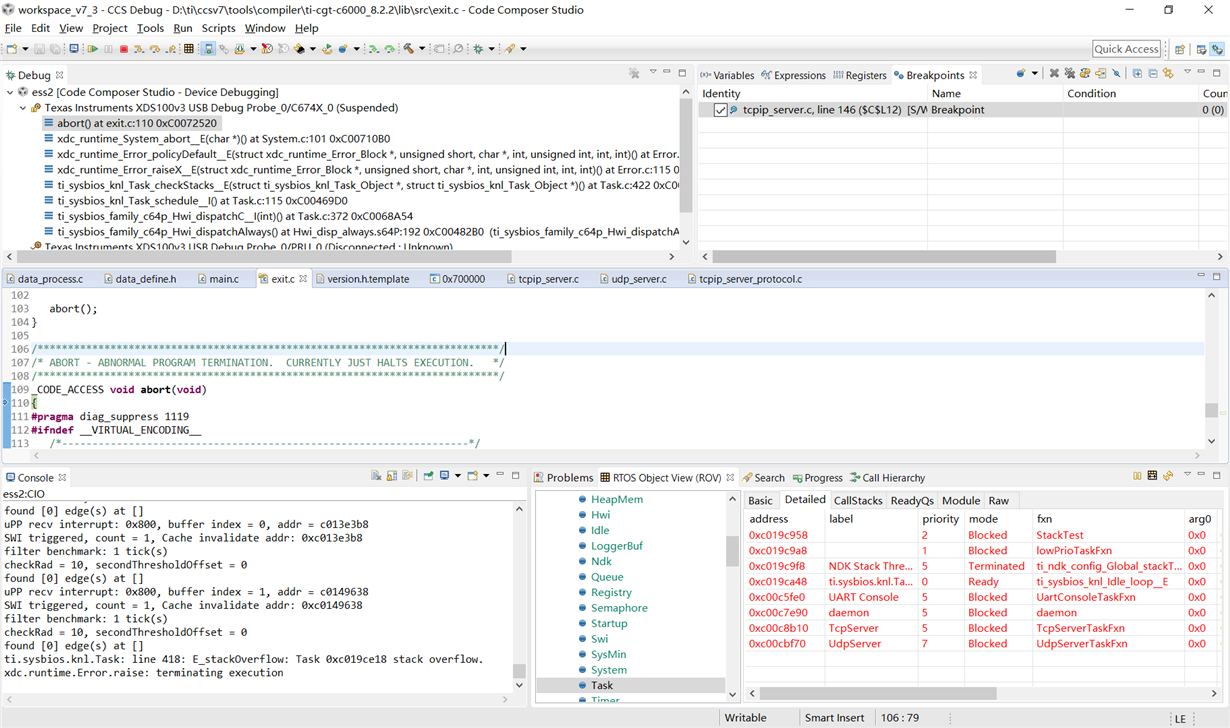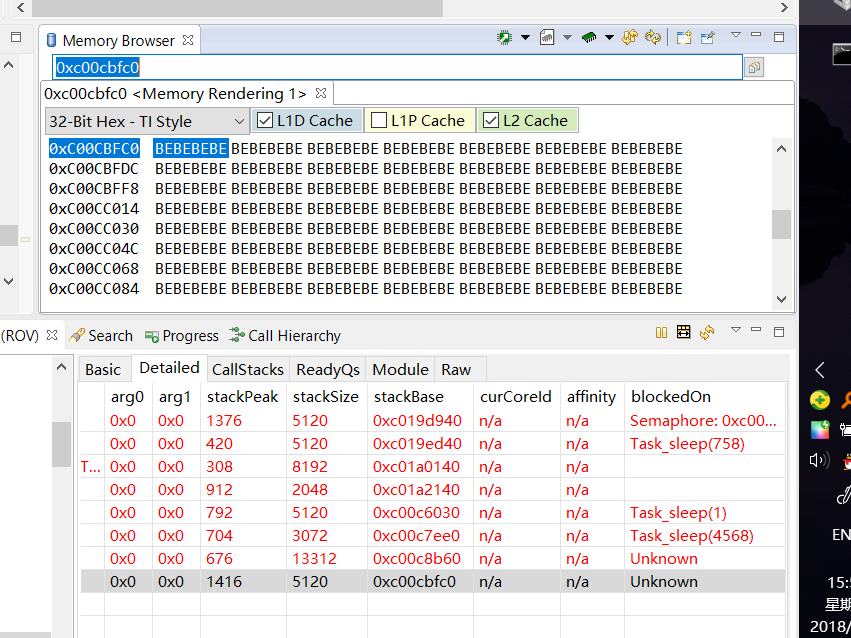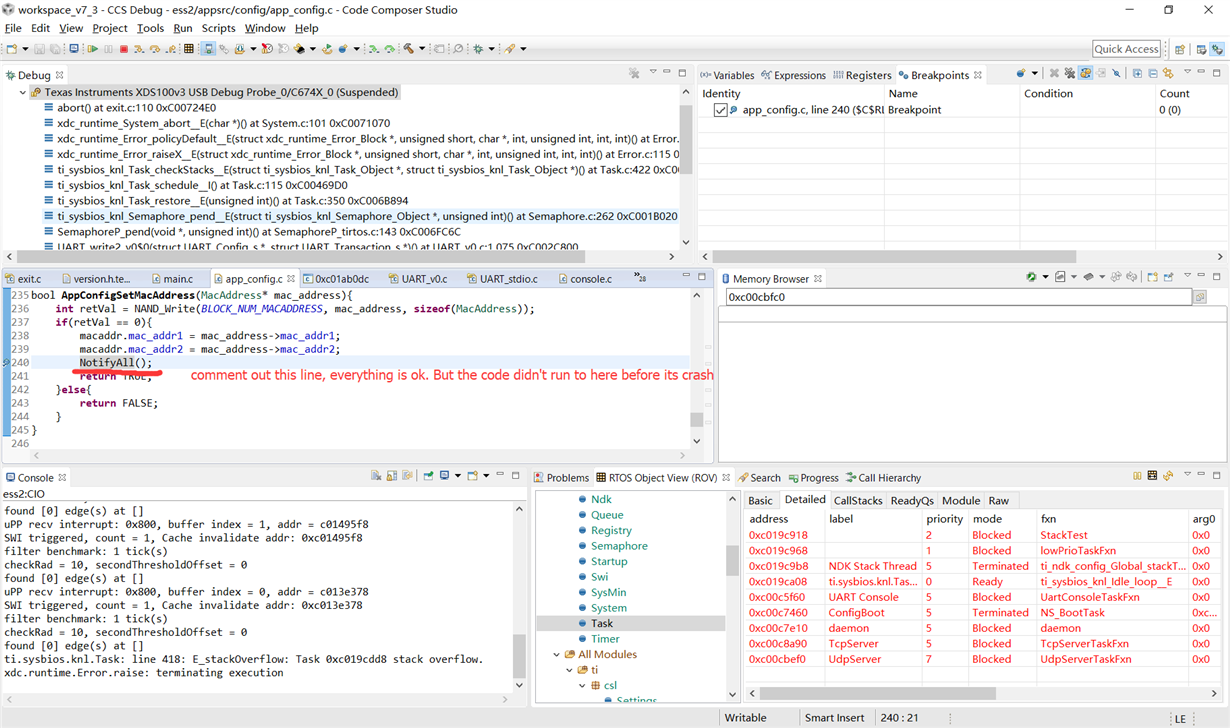Tool/software: TI-RTOS
I am developing my project. Recently I added a feature to the project, but I found program always crash with stack overflow when I plugged in the Ethernet cable. I have checked the stack usage in the ROV and found no overflow exist.
here is a screenshot when the program crashed:
Could you give me any idea to figure out the problem? Thank u.
PS:
Here is my memory map file located in Debug/*.map
******************************************************************************
TMS320C6x Linker PC v8.2.2
******************************************************************************
>> Linked Tue May 8 15:21:25 2018
OUTPUT FILE NAME: <ess2.out>
ENTRY POINT SYMBOL: "_c_int00" address: c0067a40
MEMORY CONFIGURATION
name origin length used unused attr fill
---------------------- -------- --------- -------- -------- ---- --------
IROM 11700000 00100000 00000000 00100000 R X
IRAM 11800000 00040000 00000000 00040000 RW X
L3_CBA_RAM 80000000 00020000 00000000 00020000 RW X
DDR c0000000 08000000 001ac46c 07e53b94 RWIX
SEGMENT ALLOCATION MAP
run origin load origin length init length attrs members
---------- ----------- ---------- ----------- ----- -------
c0000000 c0000000 000732c0 000732c0 r-x
c0000000 c0000000 000732c0 000732c0 r-x .text
c00732c0 c00732c0 00000040 00000000 rw-
c00732c0 c00732c0 00000040 00000000 rw- .far.1
c0073300 c0073300 0011c368 00000000 rw-
c0073300 c0073300 00052b00 00000000 rw- .far:NDK_PACKETMEM
c00c5e00 c00c5e00 00040000 00000000 rw- systemHeap
c0105e00 c0105e00 000385b4 00000000 rw- .far.2
c013e3b8 c013e3b8 000312b0 00000000 rw- MyHeap
c016f668 c016f668 00020000 00000000 rw- NandBlockCacheHeap
c018f668 c018f668 00008990 00008990 r--
c018f668 c018f668 00008990 00008990 r-- .const
c0197ff8 c0197ff8 000127c8 00000000 rw-
c0197ff8 c0197ff8 00005944 00000000 rw- .fardata
c019d940 c019d940 00005000 00000000 rw- .far:taskStackSection
c01a2940 c01a2940 00004000 00000000 rw- .stack
c01a6940 c01a6940 00003e80 00000000 rw- TcpHeap
c01aa7c0 c01aa7c0 00000550 00000550 r--
c01aa7c0 c01aa7c0 00000550 00000550 r-- .switch
c01aad10 c01aad10 00000284 00000000 rw-
c01aad10 c01aad10 0000008d 00000000 rw- .bss
c01aada0 c01aada0 000001f4 00000000 rw- .neardata
c01aaf94 c01aaf94 0000005c 00000000 r--
c01aaf94 c01aaf94 0000005c 00000000 r-- .rodata
c01ab000 c01ab000 00000200 00000200 r-x
c01ab000 c01ab000 00000200 00000200 r-x .vecs
c01ab200 c01ab200 000002b8 00000000 rw-
c01ab200 c01ab200 00000194 00000000 rw- emacComm
c01ab398 c01ab398 00000120 00000000 rw- .cio
c01ab4b8 c01ab4b8 00000fd0 00000fd0 r--
c01ab4b8 c01ab4b8 00000fd0 00000fd0 r-- .cinit
...







